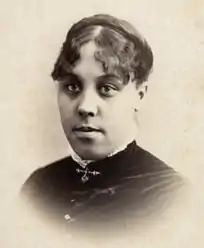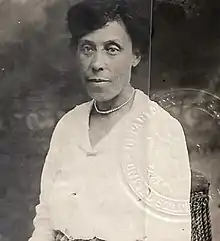Ida Gibbs
Ida Alexander Gibbs Hunt (November[1] 16, 1862 – December 19, 1957)[2] was an advocate of racial and gender equality,[3] and co-founded one of the first YWCAs in Washington, D.C. for African-Americans in 1905.[2] She was the daughter of Judge Mifflin Wistar Gibbs,[4] the wife of William Henry Hunt, and a longtime friend of W. E. B. Du Bois.[5]
Ida Alexander Gibbs Hunt | |
|---|---|
 | |
| Born | Ida Alexander Gibbs November 16, 1862 Victoria, British Columbia, Canada |
| Died | December 19, 1957 (aged 95) Washington, D.C. |
| Alma mater | Oberlin College |
| Occupation | Educator, Civil Rights Activist |
| Spouse(s) | |
| Relatives | Father, Mifflin Wistar Gibbs; Sister, Harriet Gibbs Marshall |
Early life and education
Ida Alexander Gibbs was born on November 16, 1862 in Victoria, British Columbia.[2] Mifflin Wistar Gibbs was her father. Ida's father was one of the wealthiest African-Americans in the United States in the late nineteenth century.[5] Harriet Gibbs Marshall was her sister. Their left California during the Gold Rush because of the race badges they were forced to wear and moved en masse to Victoria.[6]
In the 1860s, Gibbs moved to Oberlin, Ohio, where her mother, Maria Ann (Alexander), had studied at Oberlin College.[7]
Gibbs studied at the Oberlin Conservatory of Music (1872-1876) and Oberlin Public Schools (1876-c. 1879). Afterwards, she completed Oberlin College's Preparatory Department and earned a bachelor of arts degree in English as a boarding student.[7]
At Oberlin College, she completed a classical and scientific academic course in the Department of Philosophy and the Arts as part of the first class of black women to graduate from the school in 1884 alongside Mary Church Terrell and Anna Julia Cooper.[1] Gibbs was also elected the president of the Oberlin Literacy Society.[8] In 1892, she received an MA degree.[7] Oberlin College was the first college to accept and equally treat both African-American men and women.[5]
On April 12, 1904, Gibbs married William Henry Hunt (diplomat) at #14 N Street, NW in Washington, D.C.
Career
Academic
Ida taught Latin and mathematics before her marriage.[9][2]She had to leave her teaching job upon marriage because until 1920, married women in the public school system in Washington, D.C. were not deemed appropriate teachers for young children.[5]
She taught at Florida A&M University in Tallahassee, Armstrong Manual Training High School in Washington, D.C., and M Street High School, a prestigious African American college preparatory school in Washington, D.C.[4][2] In the 1920's, M Street High School, later renamed Dunbar High School, had four African-American women who had PhDs, Ida Gibbs being one of them, which brought a lot of attention and traffic to the school.[5]
Promoting black education, civil rights and woman's suffrage, Gibbs made her mark as an educator and Pan-Africanist.

Civil rights activism
Gibbs pursued her civil activism in a variety of ways. The Paris Peace Conference was the beginning of Gibbs being recognized as a political agent, not just a diplomat’s wife.[10] Internationally, she helped support W.E.B. DuBois in organizing many Pan-African Congresses[11] and supported the Women's International League for Peace and Freedom.[12] Gibbs encouraged W.E.B. Du Bois to come to France where she was living in order to advocate for racial inequality globally.[10] Gibbs introduced Du Bois to black, French legislator, Blais Diagne, who pushed the French government for approval of the Pan-African Congress of 1919.[10] W.E.B. DuBois relied on Gibbs for her fluency in French, her organizational work, and her political connections.[10] Gibbs acted as the primary translator at the 1919 Paris Pan-African Congress.[13] She also advocated for world disarmament and for the appointment of black representatives at the 1923 London Third Pan-African Congress in a paper entitled “The Colored Races and the League of Nations" and along with W.E.B. DuBois, she co-chaired the Conference's Executive Committee.[14][2][15] Nationally she was involved in the Niagara Movement and well as National Association for the Advancement of Colored People (NAACP). Gibbs was also active in Red Cross, both in France and in the United States, Club Franco-Etranger, the Book Lover’s Club, the Bethel Literary Society, Washington Welfare Association, the Women’s International League for Peace and Freedom.[16] After her marriage, Gibbs accompanied her husband on his diplomatic assignments, including Liberia, France, Madagascar, and Guadeloupe.[2] Through her travels with her husband, Gibbs developed an international perspective on racial justice.[12]
After World War I, Gibbs began to write for The Crisis under the pen name Iola Gibson.[1]
Gibbs published articles in the Journal of Negro History and in the Negro History Bulletin which include “The Price of Peace” (1938), “Civilization and the Darker Races” (n.d.), and the “Recollection of Frederick Douglas” (1953).[16] Her writing allowed her to share her ideas of racial progress and reform that she learned from her experienced living on three continents.[16]
She organized the first Young Women's Christian Association (YWCA) for black women.[11] Gibbs also became a board member of Phyllis Wheatley YWCA.[16]
Death
Ida Gibbs Hunt died in Washington, D.C. on December 19, 1957.[2]
References
- Ardizzone, Heidi (2013). "Marriage, Melanin, and American Racialism". Reviews in American History. 41 (2): 282–291. doi:10.1353/rah.2013.0048. JSTOR 43661544. S2CID 143048419.
- "Hunt, Ida Alexander Gibbs (1862-1957) | The Black Past: Remembered and Reclaimed". www.blackpast.org. Retrieved 14 February 2017.
- "Book review: 'Parallel Worlds: The Remarkable Gibbs-Hunt and the Enduring (In)significance of Melanin' by Adele Logan Alexander". The Washington Post. 16 May 2010. Retrieved 14 February 2017.
- "Ida Gibbs Hunt". The Washington Post. 22 Dec 1957. p. B2. ProQuest 149009999.
- "Husband And Wife Duo Paved The Way For Blacks In Diplomacy". NPR. ProQuest 1015821265.
- Lex Musta (January 20, 2018). "The Multiracial DC women who created the first integrated Baháʼí community in America". In Richard Walter Thomas (ed.). The Other Tradition. Season 1. Episode 3. Washington, DC: Time Travel Tours DC.
- "Hunt, Ida". November 16, 1862 - December 19, 1957. 1993-01-01.
- "Oberlin." <em>Cleveland Gazette</em>, 24 Nov. 1883, p. 3. <em>Readex: America's Historical Newspapers</em>, infoweb.newsbank.com/apps/readex/doc?p=EANX&docref=image/v2%3A12B716FE88B82998%40EANX-12CC2D2342F41A80%402409139-12CBE5C74EAF4AE8%402-12DBAECC8BC9A3A0%40Oberlin. Accessed 27 Apr. 2020.
- Kilian, Crawford (28 February 2011). "Born Black in Victoria in 1862 - The Tyee". The Tyee. Retrieved 14 February 2017.
- Siegel, Mona L.” Peace on Our Terms: The Global Battle for Women's Rights After the First World War”. Columbia University Press, 2020.
- Lemay, Kate Clarke, 1978- (2019-03-26). Votes for women! : a portrait of persistence. Goodier, Susan; Jones, Martha S.; Tetrault, Lisa; National Portrait Gallery (Smithsonian Institution). Princeton, New Jersey. ISBN 9780691191171. OCLC 1051137979.CS1 maint: multiple names: authors list (link)
- Baumann, Roland M. (2010). Constructing Black Education at Oberlin College. Ohio University Press. p. 68. ISBN 978-0-8214-1887-1.
- Dunstan, Sarah Claire (2016). "Conflicts of Interest: The 1919 Pan-African Congress and the Wilsonian Moment". Callaloo. 39 (1): 133–150. doi:10.1353/cal.2016.0017. S2CID 159668506. ProQuest 1790184012.
- Ramdani, Fatma. “Afro-American Women Activists as True Negotiators in the Internatio...” European Journal of American Studies, European Association for American Studies, 26 Mar. 2015, journals.openedition.org/ejas/10646.
- Ramdani, Fatma (26 March 2015). "Afro-American Women Activists as True Negotiators in the International Arena (1893-1945)". European Journal of American Studies. 10 (1). doi:10.4000/ejas.10646.
- Smith, Jessie Carney. “Notable Black American Women”. United States, Gale Research, 1992.